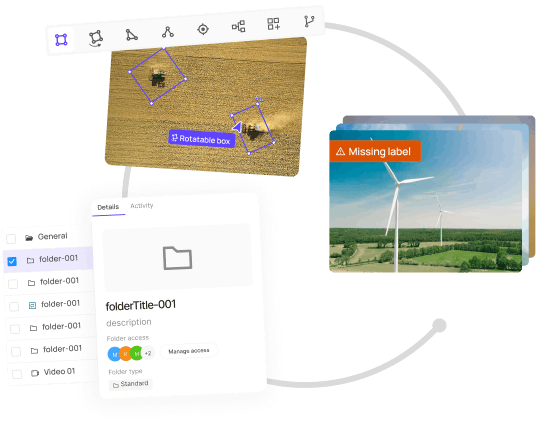Artificial Intelligence
Encord Computer Vision Glossary
Artificial intelligence (AI) is a rapidly growing field that has the potential to transform the way we live and work. AI is already making significant contributions to various industries, from self-driving cars to personalized medicine. However, as with any new technology, AI has many questions and concerns. Here, we will explore some of the most frequently asked questions about artificial intelligence.
What is Artificial Intelligence?
Artificial intelligence refers to the ability of machines to perform tasks that typically require human intelligence, such as recognizing speech, making decisions, and understanding natural language. AI algorithms can be trained using large amounts of data and can improve their performance over time.

What are the different types of AI?
There are three main types of AI:
- Narrow or Weak AI: Weak AI is designed to perform a specific task, such as facial recognition or speech recognition. It is the most common type of AI currently in use.
- General or Strong AI: This type of AI is designed to perform any intellectual task that a human can do. Strong AI is currently still in the realm of science fiction.
- Superintelligence: Superintelligence is the type of AI refers to AI that surpasses human intelligence and is capable of solving complex problems far beyond human capabilities.
How is AI Being Used Today?
AI is being used in a wide range of applications, including:
- Self-driving cars: AI recognizes and responds to different driving situations.
- Healthcare: AI is being used to diagnose diseases and develop personalized treatment plans for patients.
- Customer service: AI-powered chatbots can provide customers with instant responses to their queries.
- Finance: AI is used for fraud detection and to analyze stock market trends.
- Manufacturing: AI is used to optimize production processes and improve quality control.
- Education: AI-powered systems can personalize learning experiences for students.
- Entertainment: AI is used to recommend personalized content to users on streaming platforms and social media.
How does AI Learn?
AI algorithms learn by analyzing vast amounts of data and identifying patterns. The data used to train AI algorithms can come from a variety of sources, including text, images, and audio. Once the algorithm has been trained, it can be used to perform the task for which it was designed.
What are the Potential Risks Associated with AI?
While AI has the potential to bring about many benefits, there are also concerns about the potential risks associated with this technology. These risks include:
- Job displacement: AI could lead to the automation of many jobs, potentially resulting in job losses for human workers.
- Bias: AI algorithms can be biased if they are trained on data that is itself biased. This can lead to unfair outcomes for certain groups of people.
- Security: As AI becomes more prevalent, there are concerns about the potential for cyber attacks on AI systems.
- Privacy: AI systems can collect large amounts of personal data, raising concerns about privacy and data protection.
What are Some of the Ethical Considerations Surrounding AI?
As AI becomes more advanced, several ethical considerations must be taken into account. These include:
- Transparency: There is a need for transparency in the development and deployment of AI systems, particularly when it comes to how data is collected and used.
- Accountability: There needs to be accountability for the decisions made by AI systems, particularly when these decisions have significant impacts on people's lives.
- Fairness: AI systems need to be designed to ensure that they are fair and do not discriminate against certain groups of people.
- Human oversight: There is a need for human oversight of AI systems to ensure that they are being used ethically and responsibly.
Is AI Going to Replace Human Workers?
While it is true that AI has the potential to automate many jobs, it is unlikely that AI will completely replace human workers. Instead, AI is more likely to augment human work, taking on tasks that are repetitive or dangerous, while leaving more complex tasks to humans.
What is the Future of AI?
The future of AI is both exciting and uncertain. AI has the potential to transform many industries and bring about significant improvements in people's lives. However, there are also concerns about the potential risks associated with this technology. We must continue to monitor the development of AI and ensure that it is being used ethically and responsibly.
Overall, artificial intelligence is a rapidly evolving field that has the potential to transform the way we live and work. While there are many benefits associated with AI, risks and ethical considerations must be taken into account. As AI continues to develop, we must ensure that it is being used ethically and responsibly and continue monitoring its impact on society.